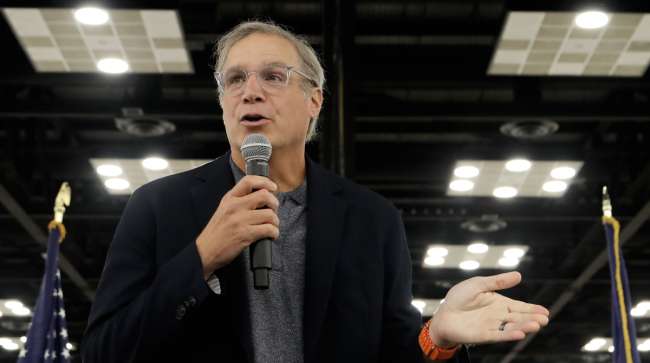In the letter, Spear told Duffy that ATA believes “enhanced enforcement and resource prioritization can make a big difference, forgoing the need for additional regulatory change.” (John Sommers II for Transport Topics)
American Trucking Associations is urging Transportation Secretary Sean Duffy to focus on three specific areas that it believes are vital to the safety and efficiency of the nation’s supply chain.
The federation in an April 10 letter outlined entry-level driver training, English language proficiency and drivers entering the U.S. from Mexico and overstaying to deliver domestic loads as issues that demand immediate attention.
In the letter, ATA President Chris Spear told Duffy that ATA believes “enhanced enforcement and resource prioritization can make a big difference, forgoing the need for additional regulatory change.”
Specifically, Spear in the letter urged Duffy to focus on the following:
- Training and qualifications for issuance of new commercial driver licenses. “While we believe the Entry Level Driver Training program has made a significant, beneficial impact, more work can be done to ensure the integrity of the program,” Spear said.
- An immediate review of Federal Motor Carrier Safety Administration directives related to enforcement of the federal English proficiency standard. “ATA has received reports that enforcement of this provision is inconsistent and that the requirement is often misinterpreted,” Spear said.
- Partnering with other federal agencies to halt instances where drivers entering the U.S. from Mexico overstay to deliver domestic loads. “While we recognize this is not within FMCSA’s immediate purview, we urge you to work with the Homeland Security Investigations Office of the U.S. Immigration and Customs Enforcement to better patrol violations of international drivers operating domestically with a B-1 visa,” Spear said.
ATA Letter to Sean Duffy – April 10, 2025
“Regarding the ELDT, ATA said it is concerned that the Training Provider Registry is still insufficiently robust to shield prospective drivers and the motoring public from fraudulent and non-compliant training entities that fast-track CDL applicants with minimal, if any, training,” the letter said. “ATA believes that these providers serve as a venue for individuals to obtain a CDL simply by paying a fee, circumventing the structured curriculum established by ELDT.
“While FMCSA has made progress in establishing tools for ELDT enforcement, FMCSA’s ELDT/TPR website shows that only four training providers have been removed from the TPR since 2023,” Spear wrote. “However, ATA has been informed that non-compliant training entities likely remain on the TPR. We believe FMCSA’s safety monitoring, auditing, and enforcement actions need to increase to ensure that unlicensed and unqualified entities are immediately removed from the TPR. In addition, we encourage FMCSA to begin better tracking the number of new CDLs issued on a state-by-state basis, including, but not limited to, the number of non-domiciled CDLs that are issued on an annual basis.”
ATA said its concerns with the English proficiency standard are the “result of FMCSA enforcement memorandum #MC-ECE-2016-006 dated June 15, 2016.
“FMCSA should immediately provide an updated enforcement memorandum to ensure that this provision is enforced consistently during roadside inspections and on-site reviews,” ATA said. “We encourage the agency to work with the Commercial Vehicle Safety Alliance to ensure that proper enforcement action is taken.”
The letter also outlined concerns over the B-1 program.
“This is an ongoing issue that we have raised with various law enforcement organizations over the last several years,” Spear said. “While ATA fully supports the legal use of B-1 drivers to transport international freight from Canada and Mexico into and out of the United States as part of an international trip, we believe that some U.S. trucking companies unlawfully employ these drivers to perform cabotage, i.e., to move domestic freight within the borders of the United States.
“Not only is cabotage illegal, but it can also have significant economic and labor impacts on law-abiding motor carriers operating in the United States. We believe that FMCSA can work with the Department of Homeland Security and U.S. law enforcement agencies to better patrol and enforce cabotage prohibitions against B-1 drivers and trucking companies.”
The letter continued, “On behalf of the ATA, we congratulate you on your recent confirmation to lead the United States Department of Transportation and the recent nomination of Derek Barrs to lead the Federal Motor Carrier Safety Administration. ATA is committed to working with you and your team to increase highway safety among all road users and to address the top transportation challenges facing the trucking industry. We are already in the process of obtaining feedback from our membership in support of President Trump’s deregulatory initiative, and we look forward to submitting our contributions.”






